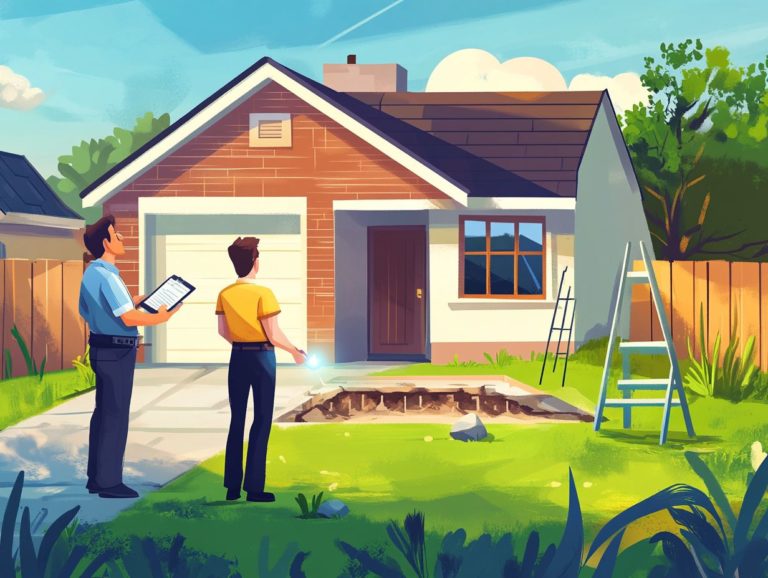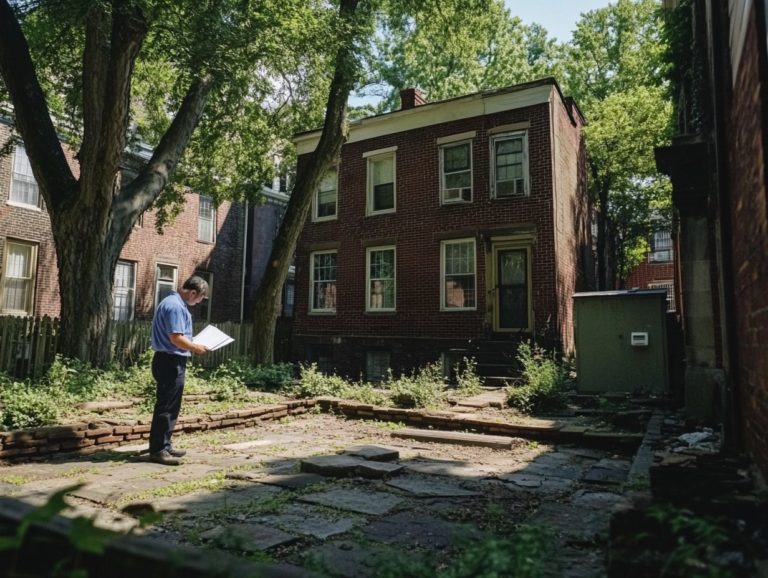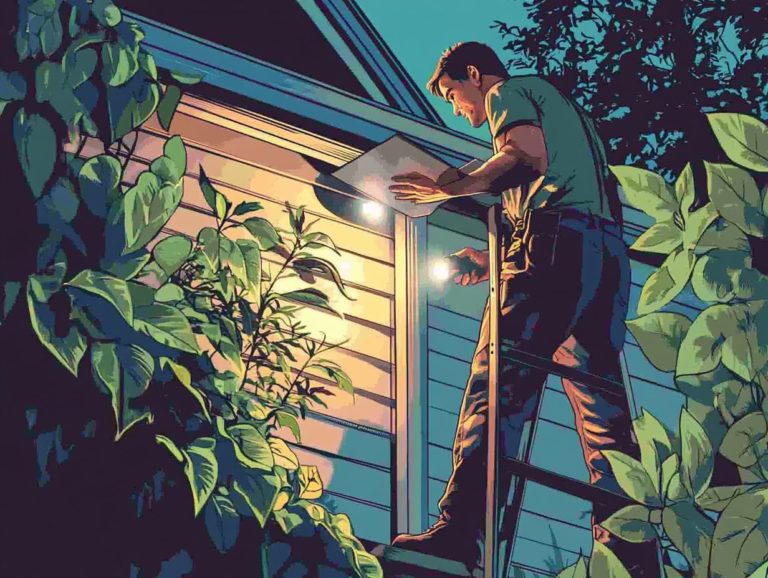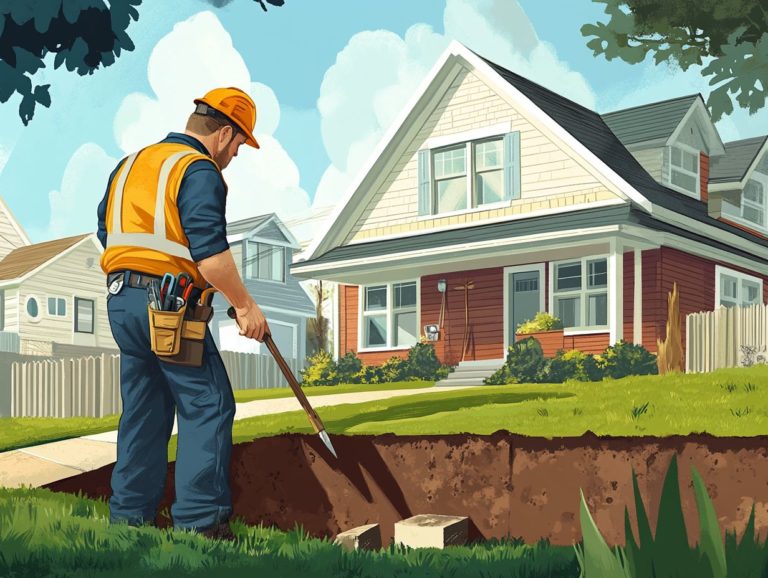How to Prepare for a Home Inspection as a Buyer
Buying a home is an exhilarating journey! Yet, it presents its own set of challenges.
Among the most vital steps in this adventure is the home inspection. This process can reveal hidden issues and enable you to make informed decisions.
You ll discover what a home inspection involves, how to select a qualified inspector, and the proactive steps you can take to prepare effectively.
You ll grasp the inspection report and outline your next steps, ensuring you’re well-prepared to navigate this crucial phase of home buying.
Whether you re entering homeownership for the first time or making a strategic investment, this guide empowers you to approach your home inspection with confidence.
Contents
Key Takeaways:
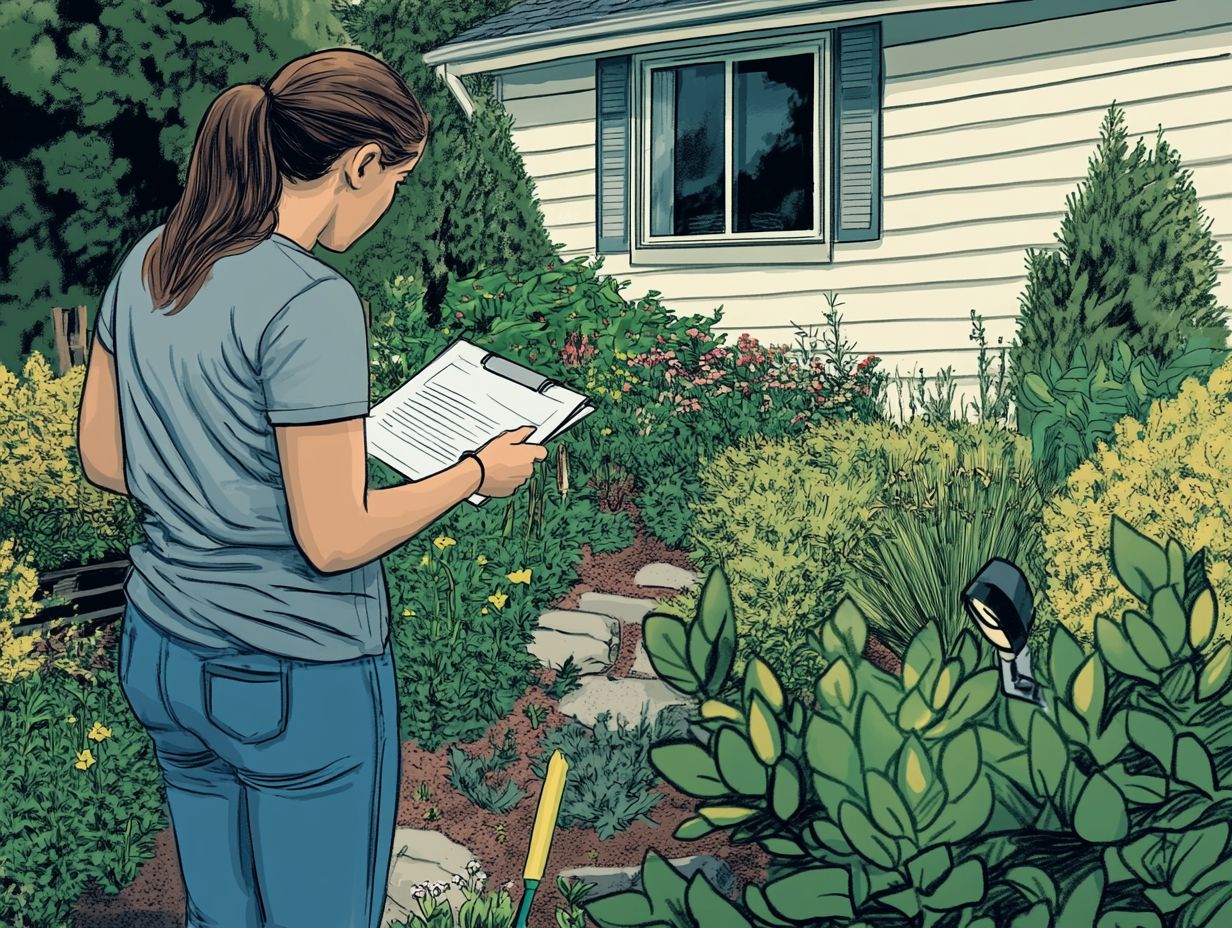
Understand why home inspections are crucial for your new home.
Find a qualified inspector by researching and interviewing candidates.
Prepare for your inspection by knowing what to expect.
Understanding the Importance of a Home Inspection
A home inspection is an important step in buying or selling a home. It helps you understand the property’s condition and any issues that may arise.
This inspection includes a detailed evaluation of the home’s systems, such as its structural integrity, electrical systems, plumbing, and significant defects that could impact the property’s value.
Licensed inspectors, like those from the American Society of Home Inspectors, perform a detailed visual examination and follow established standards. They help buyers make informed decisions based on factual data.
What a Home Inspection Covers
A home inspection covers many aspects of a property’s condition. It emphasizes essential systems, such as the roof, foundation, plumbing, electrical, and heating, ventilation, and air conditioning (HVAC) systems.
During this evaluation, the inspector uses a checklist to assess visible and hidden features. Major defects like plumbing leaks or electrical issues can lead to significant repair costs if not addressed.
Safety hazards, such as mold or outdated smoke detectors, also require attention. For example, a faulty electrical system could pose a serious fire risk.
By understanding these factors, you empower yourself to make informed decisions as a buyer. The home inspection report offers a thorough overview of critical findings, equipping you with the knowledge needed for your property investment.
Choosing a Qualified Home Inspector
Selecting a qualified home inspector is essential for a comprehensive inspection that meets established standards.
As a buyer, focus on finding licensed inspectors with strong reputations and verified qualifications. This diligence ensures your investment is sound and that you understand the property’s condition. To enhance your preparation, consider following key steps for a home inspection.
Researching and Interviewing Potential Inspectors
Researching and interviewing home inspectors is crucial for securing a knowledgeable professional who understands home inspections.
This step can significantly impact your home-buying journey. A thorough inspection, guided by how to prepare for a home inspection, can uncover critical issues that may influence negotiations in your favor.
To ensure the inspector meets your standards, verify credentials like state licensing and certifications from reputable organizations.
Dive into reviews from past clients for valuable insights into the inspector’s reliability and expertise.
Don t hesitate to ask specific questions during the interview, such as their experience with your type of property. This helps you gauge their familiarity with potential issues and better equips you for negotiations, ensuring well-informed decisions.
Preparing for the Inspection Process

Preparing for the home inspection process requires you to follow several essential steps, including understanding how to prepare for a home inspection as a buyer, which can significantly enhance the experience for both you as a homebuyer and the inspectors. By doing so, you’ll ensure a smoother transaction and help communicate the findings clearly.
Steps to Take Before the Inspection
Before the big day of your home inspection, you should take a few practical steps to set the stage for a successful property assessment. Learning how to prepare for a home inspection as a seller by reviewing maintenance requirements and getting ready for a thorough visual examination will be beneficial.
It’s crucial to ensure that the inspector can access every nook and cranny of the property, including attics, basements, and small spaces under the house no hiding spots allowed. Compiling a list of any concerns or specific issues you’ve noticed during your visits is a smart move.
Open communication with the inspector is key. Asking questions helps you understand the findings better, which enables you to make informed decisions about the property’s condition. Taking this proactive approach will help you address any concerns that may arise.
What to Expect During the Inspection
During the home inspection, you can anticipate a detailed check of numerous aspects of the property. This includes essential components like the roof, foundation, and various home systems. Such a thorough assessment may reveal potential issues that could impact your purchasing decision.
Common Areas Inspected and Potential Issues
Common areas you ll want inspected during a home inspection typically include the roof, structural concerns, plumbing, and the electrical system. Each of these aspects can reveal defects that might impact both the safety and value of the property.
For instance, the roof can show serious aging signs that need immediate attention, like missing shingles or leaks, which can lead to significant water damage if left unaddressed. Structural issues may present themselves as cracks in the walls or uneven floors, potentially jeopardizing the home s integrity.
In terms of plumbing, old pipes may be lurking, ready to spring leaks and raise concerns about water quality and the risk of flooding.
And don t overlook the electrical system it must meet safety standards because outdated wiring could pose fire hazards or simply fail to support modern appliances. Identifying these issues early is crucial for you as a prospective homeowner. Repairs can be costly, and they might significantly influence your investment decisions.
Interpreting the Inspection Report
Interpreting the home inspection report is an essential skill for you as a buyer. This document holds crucial insights regarding defects identified, recommendations for repairs, and the specific terminology employed by inspectors. Mastering this report enables you to make informed decisions about your potential investment.
Understanding the Terminology and Recommendations
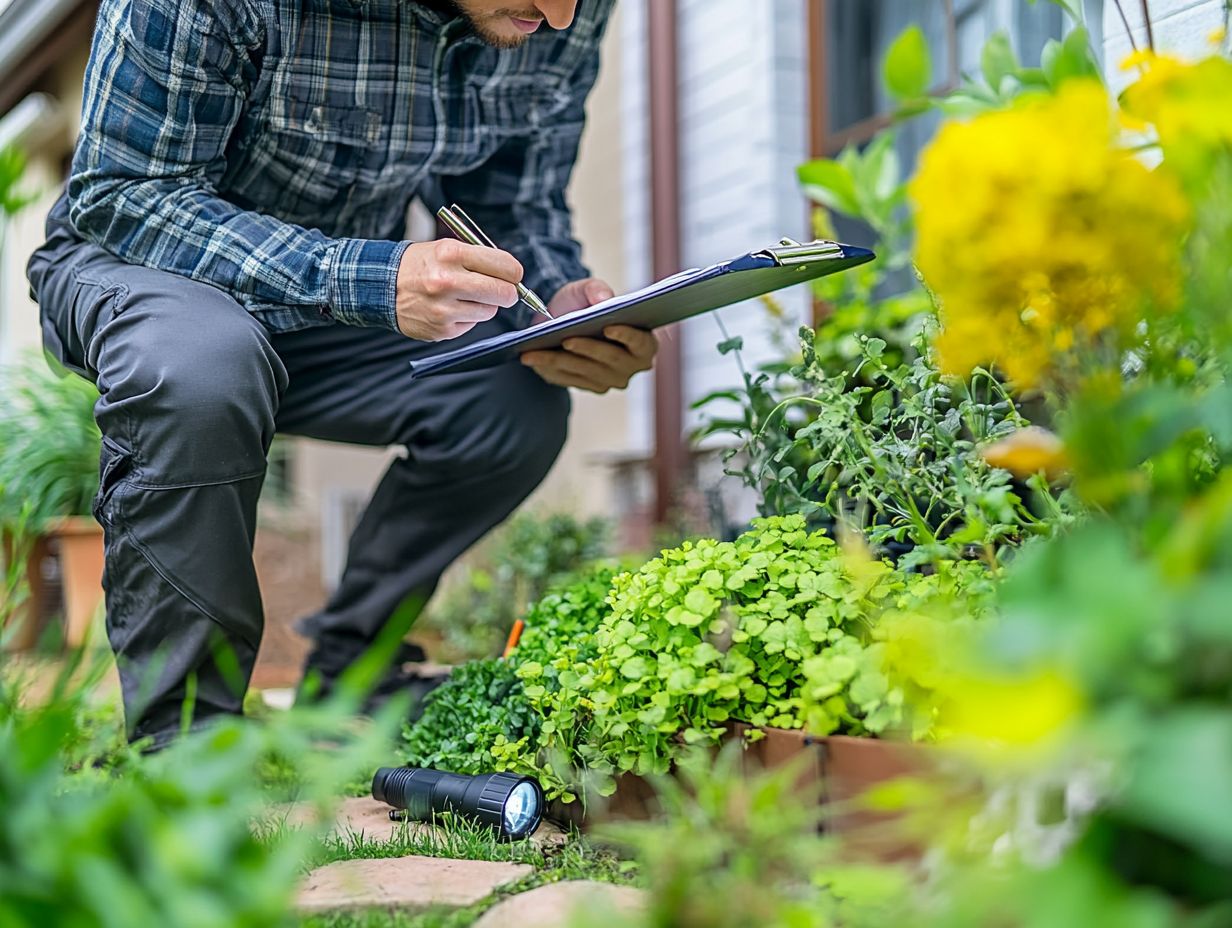
Understanding the terminology in your home inspection report is crucial for grasping the seriousness of both major and minor defects, along with the inspector’s recommendations. As a buyer, you may come across terms like “structural issues” or “cosmetic damage,” and it’s important to recognize how these can differ in urgency and cost.
Major defects could involve significant problems with the roof or foundation, while minor defects might be as simple as fixing a loose doorknob.
By prioritizing repairs according to the inspector’s categorizations, you can allocate your resources wisely, tackling safety hazards first before moving on to those aesthetic upgrades. This clear understanding not only enhances your negotiation power but also paves the way for a smoother transition into homeownership.
Next Steps After the Inspection
Following the home inspection, your next steps as a buyer generally include negotiating repairs in light of the inspection findings and possibly revising your offer to more accurately reflect the true value of the home. Understanding the importance of a home inspection for buyers can help you make informed decisions during this process.
Negotiating Repairs or Adjusting Offer
Negotiating repairs or adjusting your offer after an inspection is crucial in the buying process. You’ll want to leverage inspection findings to advocate for necessary repairs or price adjustments.
Additionally, understanding how to show the inspection results clearly can shape the outcome of your negotiations. Prepare a comprehensive summary that highlights key findings, such as major structural issues or safety hazards, and back them up with relevant data, including photographs and repair estimates.
This evidence strengthens your position and sets the stage for a productive discussion. The impact of inspection results goes beyond mere price adjustments; it can influence timelines, contingencies (conditions that need to be met), and even the trust level between both parties.
By entering the conversation with transparency and a well-articulated rationale, you can craft a compelling case for your requests, paving the way for a more favorable agreement.
Considering Additional Inspections
In certain situations, it may be essential to consider additional inspections after the initial home inspection, especially if safety concerns or potential plumbing and structural issues arise.
If you see signs of water damage, act quickly and consult a qualified mold specialist to evaluate air quality and potential health risks. Similarly, if you spot cracks in the foundation or walls, reaching out to a structural engineer can provide valuable insights into the property’s integrity.
These extra inspections protect your investment and give you crucial information that can be instrumental during negotiations or when making future renovation decisions.
By taking these precautions, you can ensure a well-informed purchase and effectively shield yourself from unforeseen costs down the line.
Frequently Asked Questions
1. What is a home inspection and why is it important?

A home inspection is a thorough examination of a property’s condition, typically done before the sale is finalized. It helps buyers identify potential issues or concerns with the property before making a purchase, giving them a better understanding of what they are buying.
2. When should I schedule a home inspection?
It is recommended to schedule a home inspection as early as possible in the buying process, ideally once you have made an offer on a property. Understanding the basics of home inspection for buyers gives you time to address any concerns before finalizing the sale.
3. How do I find a reputable home inspector?
You can find a reputable home inspector by asking for recommendations from your real estate agent, friends, or family members who have recently purchased a home. You can also search for certified home inspectors through organizations like the American Society of Home Inspectors.
4. What should I do to prepare for the home inspection?
Before the home inspection, thoroughly clean and declutter the property so the inspector has easy access to all areas. Additionally, consider reviewing how to prepare for a home inspection and gather important documents related to the property, such as maintenance records or warranties, to provide to the inspector.
5. Can I attend the home inspection?
Yes, it is recommended for buyers to attend the home inspection. This gives you the opportunity to ask any questions and address any concerns directly with the inspector, as well as learn more about the property’s condition.
6. What should I do after the home inspection?
After the home inspection, carefully review the report and ask the inspector for clarification on any unclear areas. If major issues are found, don’t hesitate to negotiate with the seller for repairs or a lower price. For a comprehensive approach, consider understanding the home inspection process for buyers and consult with your real estate agent for guidance on the best course of action.


